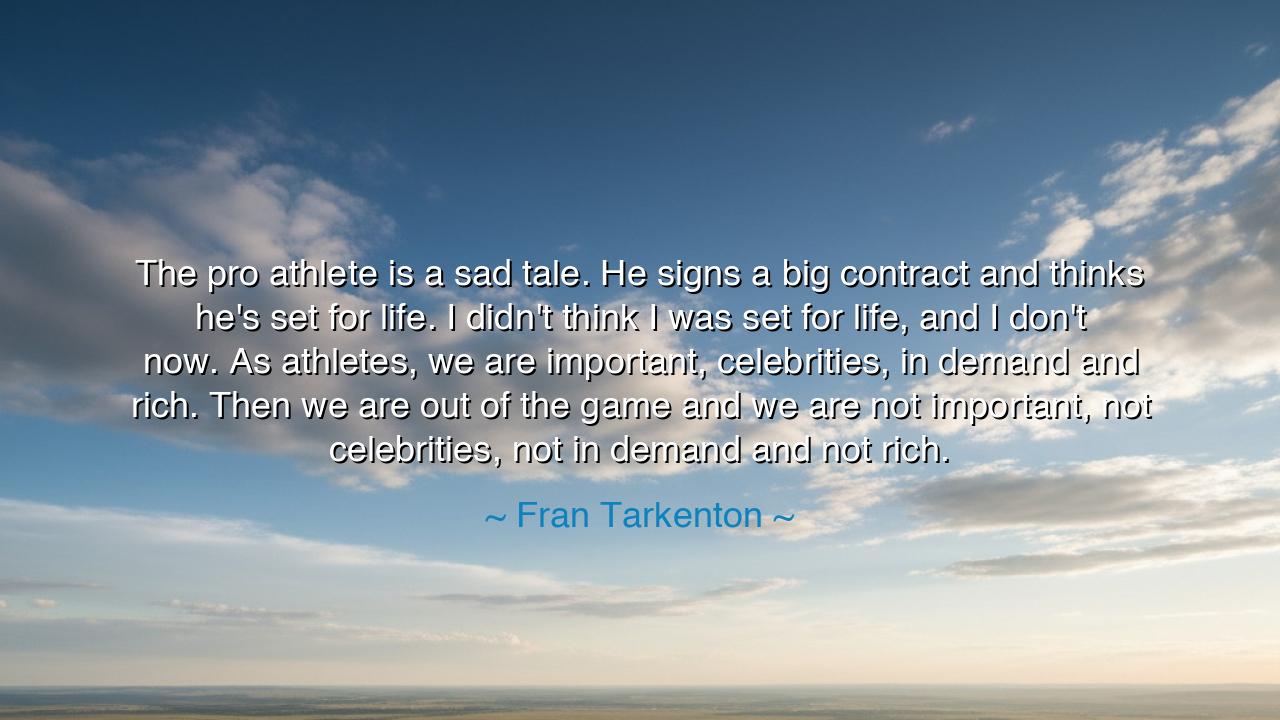
The pro athlete is a sad tale. He signs a big contract and thinks
The pro athlete is a sad tale. He signs a big contract and thinks he's set for life. I didn't think I was set for life, and I don't now. As athletes, we are important, celebrities, in demand and rich. Then we are out of the game and we are not important, not celebrities, not in demand and not rich.






Hear the solemn warning of Fran Tarkenton, who speaks not as one dazzled by glory, but as one who has seen its fleeting nature: “The pro athlete is a sad tale. He signs a big contract and thinks he’s set for life. I didn’t think I was set for life, and I don’t now. As athletes, we are important, celebrities, in demand and rich. Then we are out of the game and we are not important, not celebrities, not in demand and not rich.” These words pierce the illusion of fame and fortune, revealing the truth that greatness on the field is but a temporary crown, easily lost when time and age strip away strength.
The life of a professional athlete is a parable of impermanence. In youth, his body is mighty, his name is cheered by thousands, his face graces the screens of the world. But the years of glory are few, the body wears down, and the cheers fall silent. Tarkenton speaks of the cycle: from celebrity to obscurity, from wealth to worry, from demand to dismissal. The sad tale is not in the victory, nor even in the decline, but in the false belief that the applause would last forever.
The ancients told this story again and again. Consider the gladiators of Rome. In the arena they were hailed as gods of blood and spectacle, adored by the crowd, feared by their foes. Yet once their strength was spent, once the arena closed to them, they were discarded, forgotten, often impoverished. Their worth was bound only to their ability to fight, and when that was gone, so was their status. Tarkenton’s lament echoes their fate, reminding us that society often consumes its champions and then casts them aside.
We may also recall the story of Joe Louis, the great boxing champion of the twentieth century. He was beloved, wealthy, a symbol of strength and pride. Yet after his fighting years, he fell into debt, hounded by taxes, and reduced to working as a greeter in a Las Vegas casino. The man who once carried a nation’s hope was left in quiet humiliation. His story is the very embodiment of Tarkenton’s truth: that the athlete’s wealth and importance vanish quickly once the game is no longer theirs to play.
And yet, Tarkenton does not speak only of despair. His wisdom lies in his refusal to believe that a contract, however great, meant he was “set for life.” He understood that the field was only one chapter, not the whole story. This humility and foresight preserved him, while many others perished in the illusion of unending fame. His words teach that to endure, one must build an identity not on fleeting applause but on deeper foundations: character, skill, and purpose beyond the game.
The lesson for us all is clear: do not tie your worth to the temporary crowns of life. Whether it is fame, wealth, or influence, these things fade. Instead, cultivate inner strength, wisdom, and lasting purpose. Athletes, artists, leaders—all must prepare for the day when the lights dim. The man who is prepared will endure with dignity; the one who is not will be lost in bitterness.
Therefore, take Tarkenton’s counsel as a guiding flame: live not for the fleeting roar of the crowd, but for the steady work that builds a life beyond applause. If fortune comes, use it wisely; if fame arrives, wear it lightly. For the true measure of greatness is not how brightly one shines in youth, but how steadfastly one stands when the lights go out. And in this, every soul—athlete or not—may find the strength to turn a sad tale into a lasting legacy.






AAdministratorAdministrator
Welcome, honored guests. Please leave a comment, we will respond soon